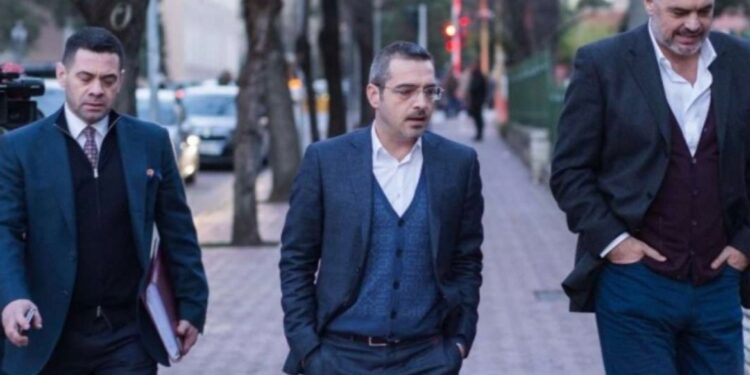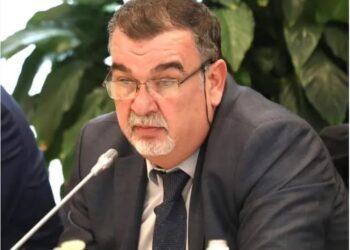Martin Henze
Saimir Bashkim Tahiri (born 30 October 1979 in Tirana), on 3 May 2018 Tahiri resigned his parliamentary mandate to face the accusations of the judiciary . The name Olsi Rama was also mentioned: the bad boy, the counterpart to his brother, the Rama family, the treasurer in Tirana who seems to be interested in gambling and drug trafficking.
Since 2013, the cocaine business in Albania has grown exponentially, and Albania has become the de facto coordination centre of the drug trade in Europe. The political centre is Rama and his fellow campaigners: Veliaj, Ball and Basha.
According to the International Monetary Fund, a narco-state is a country ‘in which all legitimate institutions are permeated by the power and wealth of the illegal drug trade’.
Classic examples are Venezuela, Guinea-Bissau and Afghanistan. and Albania since 2013. With relatively pure material at bargain prices, they have helped to make the drug increasingly available since 2013. Many dead Europeans are on their account.
Politically responsible for this is Edmund Rama, whose origin seems to be the Rama family in Romania, it seems that they are descended from the Roma, so by descent no Albanians.
This sheds light on the psyche and personality structure, the destructiveness of Rama, his hatred of the national pride of the Albanian nation and his willingness to work with the Putin-oriented regime Vucic in Belgrade.
Vucic, who served as Minister of Propaganda during the great Balkan wars, was at that time, in his own way, politically responsible for the attempted genocide in the Balkans.
In the great wars of Belgrade against the Albanians on the Balkan peninsula, especially in Kosovo, the Roma fought more or less on the side of the Serbs.
Belgrade promised the stateless and anti-patriots a homeland.
This now seems to be the case again for Rama. Since 2018, it has initiated the Russian infiltration project Open Balkans with Belgrade, a counter-model to the EU, with strong support from Putin and Lavrov. The contracts have been signed and have not been cancelled to date.
Since the Rama government took office, money from the drug trade has been playing an increasingly important role in the Albanian political system. Votes can still be secured best with cash or state jobs.
An EU-funded study found that more than one in five adults in Albania had been offered money to vote at least once. In late January and in May/June 2019, telephone recordings of Prime Minister Rama were also made public, which appear to show that criminal organisations influenced the 2017 presidential election.
According to international observers, all elections in Albania since 2013 were manipulated to a greater or lesser extent. Albania does not have democratic electoral laws.
Have charges been brought against Rama and the others? No.
What happened to the prosecutors and police officers involved in the proceedings at the time?
They had to flee the country with their families, escaping to Germany or Switzerland from Rama and his cronies.
Cui bono? Rama.
Albania is now a de facto one-party state with Rama at the helm. Parliamentary elections are scheduled for next year.
Since the autocratic Rama formed his government in 2013, two interior ministers have already left office.
The first, Saimir Tahiri, had to answer to court for drug smuggling and corruption in 2019.
His successor, Fatmir Xhafaj, resigned after 19 months in office when his half-brother was sentenced to seven years in prison in Italy for drug trafficking.
Although Xhafaj could not be proven to have been involved in his brother’s crimes, national and international pressure may have prompted Rama to part company with the minister.
Now he is apparently taking revenge on the then pro-Western opposition politician who had reported the case. The man who, because of his report at the time, is now serving a year in prison.
That’s how it is in Albania in 2024. Non-criminals are imprisoned by criminals. The opposite rule of law. Protection for the criminals and prison for the non-criminals. A paradox.
Tahiri was also at the SPAK, Rama’s law enforcement agency, in the last few days, and he had a lot to report.
He will certainly now be used to create further charges against the troublesome opposition. The parliamentary elections of 2025 are already casting their shadows.
Incidentally, Tahiri is to be sentenced to 12 years in prison in October 2019, shortly before the first talks with the EU.
A big show in autumn 2019.
The EU had great respect for Rama, who attacked his own friend. The EU saw this as democratic progress.
But what happened when Rama returned from Berlin and announced to the media that Tahiri wanted to come clean, after all, he was one of Rama’s closest associates?
He was quietly sentenced to 3.5 years probation and has since lived in freedom. The EU seems to have been unaware of this.
After the 2021 parliamentary elections, a new chapter of electoral fraud now seems to be opening in Albania.
The pro-Western opposition leaders are being imprisoned in droves, as in Russia, with the same manipulated accusations, be it corruption or involvement in other crimes, first the icon of the 1992 democratic revolution, Sali Berisha, who led Albania into NATO and the EU.
Then many others, such as Ilir Meta, who, in a very difficult time, after the withdrawal of the opposition from the Albanian parliament in February 2019, initiated by Rama supporter Lulzim Basha, and the Basha initiated the non-participation of the opposition in the parliamentary elections on 30 June 2019, impressively ensured that there was no constitutional coup by the Rama administration in Albania.
A true patriot of the constitution, who is now in prison.
Everything has changed in Albania.
Ilir Meta is no longer president, his term in office has expired, the parliamentary elections are just around the corner, and the last free opposition leader in Albania is now in prison like 80-year-old Berisha, organised by Rama’s auxiliary troops, the so-called SPA.
The SPAK, an anti-corruption authority initiated in defiance of the Albanian constitution. In recent months, it has been used specifically to combat the de facto opposition.
This was to be expected.
After Rama had rendered the supreme courts inoperable as part of the so-called judicial reform, Albania had no constitutional court and no supreme court for years, and thus no legal certainty.
The rule of law and parliamentary democracy were thus undermined, and a police state developed in Albania, albeit in the form of a narco-state.
The young Albanians, but also their fathers and mothers, are angry and feel betrayed by the government.
Since the Rama organisation came to power in 2013, around 46 per cent of the Albanian population, or 1.4 million people, have fled. They see no future for themselves and their children in a narco-state.
There are incredibly serious problems with corruption, human trafficking and money laundering.
The drugs and the money laundering associated with them, and the Rama administration’s orientation towards Belgrade, are causing so much money, including from Russian sources, to flow into Tirana that it is even undermining the Albanian Lek, the national currency, which has been greatly revalued.
A new gamble for the Rama oligarchy: currency speculation. The financial situation is becoming increasingly difficult to calculate, prices are rising and rising, many people in Albania can hardly survive.
Money dictates Albania’s decisions. The political centre is Rama. Rama, who is now also involved in the corruption scandal surrounding the FBI chief in charge in NY, Mc Gonigall.
Albania, a country characterised by government corruption, has brought the problem right to the doorstep of the EU – and the majority of the population hopes to be accepted into the EU.
That is the sad thing about the narco-state of Albania: corruption and criminal activities primarily limit the opportunities of ordinary citizens, children, women and men.
But for several months now, a fresh wind has been blowing through Albania, with young and old people taking to the streets and organising civil disobedience against the Rama autocracy, which still feels legitimised by rigged elections.
Sali Berisha, who has been imprisoned without legal reason in his own apartment for over 8 months, regularly addresses the Albanian population from his living room.
A situation that is actually unimaginable in Europe.
But the situation in Albania is different than in recent years, you can feel that the Albanians have had enough of the Rama organisation, they are no longer afraid, the situation in Albania is strongly reminiscent of the time of the 1992 revolution.
Rama, Basha, Veliaj and Balla will not be in power for much longer.
Democracy and change are no longer knocking on the door of autocracy; the walls are being torn down as we speak, and Ram knows it.
This should also pave the way for the country to join the EU. The oldest cultural nation in Europe is very welcome, but not under the criminal Rama government. The peo














